In this blog I’m going to talk about some of the awesome potential benefits of cold exposure, including how it may be able to boost our immune system, increase antioxidant activity and trigger mitochondrial biogenesis.
So first of all my usual disclaimer; this is not medical advice, this is for information purposes only.
First of all how can we actually experience cold exposure? Well there are many ways; we can take an ice bath, we can go into a plunge pool, jump into a cold lake, take a cold shower or just go for a walk on a winter day in our shorts and T shirt. Something that’s getting quite popular is cryotherapy, where you actually get into a chamber and it goes really, really cold.
I will say that the potential benefits I talk about in this blog were drawn from a variety of studies that used a variety of cold exposure methods, using a variety of temperatures, durations and frequencies. For example, one study followed a group who did whole body cryotherapy for 2 min at -110 degrees celsius 3 times a week for 12 weeks. Another study followed a group who just had one exposure to cold-water immersion at 20 degrees celsius for one hour, so quite a difference between the two.
That being said my goal for this blog isn’t to communicate the ideal temperature or dose, my goal is just to share some of the potential benefits of cold exposure in general, regardless of means or the dose. It’s my personal hope and suspicion that if I take a really cold shower for a few mins a day, I should experience at least some of these benefits to some degree…. and I hope I do! Especially in the winer here in the UK when the water is really, really cold! There’s nothing like it. It’s a shock and hormetic stress to the body, it’s like its under attack. Surely that’s got to be triggering some hormetic responses!
So, let’s jump into some of the benefits.
The first benefit of cold exposure is that it induces mitochondrial biogenesis. What is that?
Well first of all let me talk about what mitochondria are. They are tiny little organelles that live inside pretty much all the cells of our body. Some cells will have 100 and some will have up to 100 thousand. These organelles are crucial to health and being youthful because they are responsible for producing all the energy that we us from everything from blinking to thinking. Mitochondrial biogenesis is basically a process where we make new mitochondria. We all day this everyday.
The bad news is that as we age our mitochondria get damaged. Worse still, our ability to make new mitochondria through mitochondrial biogenesis diminishes. But a I say, the good news is that cold exposure actually induces mitochondrial biogenesis. It actually triggers the master gene that controls mitochondrial biogenesis, which is PGC1-alpha. More healthy fresh mitochondria, more energy, better organ function, less disease and more youth!

So that is the first benefit, it induces mitochondrial biogenesis.
The second benefit of cold exposure is that it potentially lowers the amount of free radical damage to our cells and our DNA. You’ve probably heard the term ‘free radicals’. Free radicals are also called reactive oxygen species (ROS) and they are a product of everyday living, can’t be avoided and cause damage to cells and our DNA. This damage, if not repaired, can lead to all kinds of problems in the future; cancer being one of them.
The body has a way to deal with these free radicals and that is through the natural production of anti oxidants in the body. I like to think of antioxidants as cannon fodder, they kind of jump on the ROS like jumping of a grenade and they take the hit for us. BUT, they’re like supermen because they don’t actually get damaged themselves in the process. So antioxidants are the body’s natural defence to free radical damage.
I mentioned that cold exposure lowers free radical damage and it does that by increasing antioxidant enzyme activity in the body. So we basically make more antioxidants to deal with the free radicals. Two antioxidant enzyme systems that cold exposure increase are glutathione reductase and superoxide dismutase. Both of these are very potent. Apparently activating antioxidant pathways in the body is FAR, FAR more powerful than taking an antioxidant supplement.

Okay, the third benefit of cold exposure is that it may help with depression and mood. Cold exposure causes a very robust release of a hormone called norepinephrine, which is released in the blood and the brain. Norepinephrine is also a neurotransmitter and it’s associated to focus, attention and our fight or flight response. It’s been shown that if you deplete people’s norepinephrine it actually causes depression! So cold exposure increases our release of norepinephrine. Now this is one I think that a cold shower can definitely trigger, because when I’m done and turn off the taps I feel great! I’m very, very alert and there is a big positive boost in my mood. If you’re skeptical then I would implore you to give it a try; I’m pretty confident you’ll feel something!
The fourth benefit of cold exposure is it can potentially reduce inflammation in the body. A little bit of inflammation now then is completely natural and healthy. It serves to get rid of the cause of cell injury and initiates tissue repair. However, when we have too much inflammation from things like too much sugar, that’s when have a big problem. Inflammation is a key driver of aging and is associated to most diseases out there.
Now, I’ve already mentioned that cold exposure causes a release of the hormone norepinephrine in the blood and brain and that norepinephrine is associated to focus and mood. Well it turns out that norepinephrine also inhibits the inflammatory pathway by decreasing a key inflammatory molecule called TNF alpha. Too much TNF alpha has been implicated in pretty much all diseases out there. So cold exposure will decrease the amount of TNF alpha we make and therefore may reduce inflammation.
The fifth benefit of cold exposure is that it may strengthen our immune system. Having a strong immune system is not only important for fighting off colds but it’s also critical to help us fight diseases like cancer. To have a strong immune system we want to have a good stock of strong healthy immune cells. Unfortunately, as we get older our stock of immune cells will reduce and some of them will stop working too. This is known as immunosenescence. So if we have a chance to increase our stock of immune cells, we should take it!
So cold exposure may increase the number of some immune cells (or lymphocyte cells) including cytotoxic T lymphocytes (which play a role in killing cancer cells) and also natural killer T cells that kill viruses and tumor cells.

The sixth benefit of cold exposure is that it may help to slow down brain aging and prevent neurodegenerative diseases by protecting and rebuilding brain synapses. Synapses are how neurons communicate with each other and how memories are formed. However, I will say this is all theoretical at the moment as the studies demonstrating these effects have been on animals and not humans.
So how does cold exposure protect and rebuild synapses? Well it turns out that something called Cold Shock Proteins (CSPs) play a very important role in this process. In particular, one CSP called RNA binding motif 3 or RBM3. It’s been shown that cold exposure increases the activity of RBM3, allowing it to exert its function and help repair these synapses. The good news is, even mild cold exposure is enough to increases the activity of RBM3.
So those are the 6 potential benefits of cold exposure! Pretty cool, eh? I will summarise to wrap up –
- Cold exposure may induce mitochondrial biogenesis
- Cold exposure may reduce free radical damage to cells and DNA
- Cold exposure may be able to help with depression
- Cold exposure may help to reduce inflammation
- Cold exposure may improve our immune system
- Cold exposure may help to slow down brain aging
